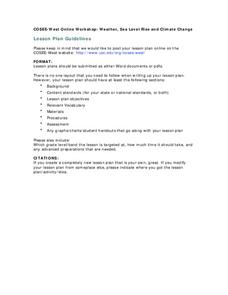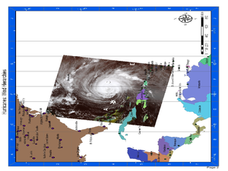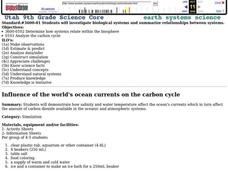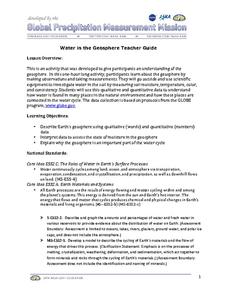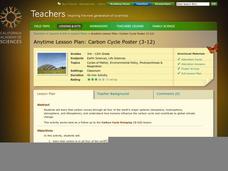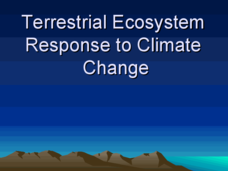Curated OER
Volcanic IntEruptions
Seventh graders research about a devastating eruption of a certain volcano. In this earth science activity, 7th graders discover the climate changes that occurred due to a volcanic eruption. They create a presentation about their...
Curated OER
Where in the World Is All the Water?
Learners investigate the distribution of the earth's water. They conduct a demonstration of water distribution, and create a pie graph to display the results.
Curated OER
Water Cycle
Learners identify the different stages in the water cycle. In this earth science lesson, students calculate the residence time of water in oceans using a mathematical formula. They explain how this cycle regulates the Earth's climate.
Curated OER
The International Space Station-Follow that Graph!
In this altitude change of the International Space Station worksheet, students observe a graph of the change in altitude of the space station over time due to the Earth's drag. Students solve 3 problems using the data in the graph.
Curated OER
Internet Quest: Weatherman Walt-Why the Sky is Blue
Students analyze atmosphere and light. In this earth science lesson, students are introduced to an investigation about why the sky is blue. Students complete a WebQuest to answer the question.
Curated OER
Exploring Explorations-Ocean Exploration
Students learn about Earth's deep ocean discoveries and their benefits. In this ocean exploration instructional activity, students review previous explorations of the Earth's deep oceans and learn about the discoveries of the past.
Curated OER
Weather, Sea Level Rise and Climate Change
Eighth graders compare and contrast weather and climate. In this earth science lesson, 8th graders research weather data site and analyze historical data. They present their findings in class and explain identifiable trends.
Curated OER
Hurricane Winds: A Spatial Hierarchy of Processes at Different Scales
In this earth science lesson, students study a satellite image of hurricane Isabel and write answers to 5 questions that follow. They match predictions to the map locations.
Curated OER
The Future of Arctic Sea Ice
High schoolers research about the importance of sea ice to world climate and sea organisms. In this earth science lesson, students create a model of present and future Arctic sea ice communities. They discuss how ice melting affects...
Curated OER
When Dinosaurs Ruled
Students research about plants and animals during Triassic period. In this earth science lesson, students draw pictures of their chosen plants and plants for the bulletin board. They present their project in class.
Curated OER
AP: Chapter 26: Origin of Life
Five pages take biologists on a generalized survey of the origin of life. Queries are made regarding theories of how life developed, ancient Earth conditions, and the ever-changing field of taxonomy. The experiments of different...
Curated OER
Atmospheric Shielding from Radiation I
In this radiation worksheet, students calculate the distance of a satellite in orbit to determine the placement of a radiation detection device. This worksheet has 2 problems to solve.
Curated OER
The Layers of the Earth's Atmosphere
In this Earth's atmosphere worksheet, students will complete a graphic organizer by filling in the 4 layers of the atmosphere starting with the troposphere.
Curated OER
What's "In" There: A Study of the Inner Planets - Mercury, Venus, Earth, and Mars
First graders identify and explore the four inner planets. In this planet science activity, 1st graders watch a PowerPoint about the planets. Students read the book Our Solar System and discuss the inner planets. Students create a book...
Curated OER
Earth Systems
Ninth graders investigate biological systems. They summarize relationships between systems. Students determine how systems relate within the biosphere. They analyze the carbon cycle.
US Environmental Protection Agency
Carbon Through the Seasons
Meteorologists view an animated video by the Environmental Protection Agency to learn how the carbon cycle works, and then move into groups to analyze and graph actual data of the atmospheric carbon dioxide concentration from Hawaii's...
Curated OER
A Comparison of Cloud Coverage Over Africa
Students use a NASA satellite data to contrast amounts of cloud coverage over different climate regions in Africa. They explore how Earth's major air circulations affect global weather patterns, and relate to local weather patterns.
McAuliffe-Shepard Discovery Center
Global Warming in a Jar
This well-organized lab activity introduces earth science pupils to the greenhouse effect. They will set up two experiments to monitor temperatures in an open jar, a closed jar, and a closed jar containing water. Ideally, you would have...
National Wildlife Federation
Why All The Wiggling on the Way Up?
Some of the CO2 emitted by burning fossil fuels is removed from the atmosphere by natural sinks, such as the ocean. The fifth engaging lesson in the series of 21 examines the CO2 data from three very different locations. It then makes a...
Baylor College
Measuring and Protecting Skin
Several subjects are addressed within the context of a science lesson about the sun's ultraviolet rays. Elementary earth scientists consider protection of the skin with sunscreens (health), estimating and measuring surface area or an...
Curated OER
Water in the Geosphere
Through a PowerPoint presentation and the embedded animation and video, earth science enthusiasts find out about the moisture in the soil beneath our feet. In the animation, follow a water molecule on its path through the water cycle. As...
California Academy of Science
Carbon Cycle Poster
Humans can have a big impact on the environment, specifically the influence they have on the carbon cycle. First, the class will define and discuss each of the earths four major spheres, the biosphere, hydrosphere, atmosphere, and...
Curated OER
Terrestrial Ecosystem Response to Climate Change
An extensive investigation of the Earth's climate changes awaits your environmental science classes. This top-notch presentation begins by looking at the history of Earth's climate and then predicts the impact on each major terrestrial...
Baylor College
Using Heat from the Sun
Let's heat things up! This simple experiment demonstrates for students the important role the sun plays in providing the earth with energy. Place one cup of water in direct sunlight and one in shade, then take measurements in order to...








